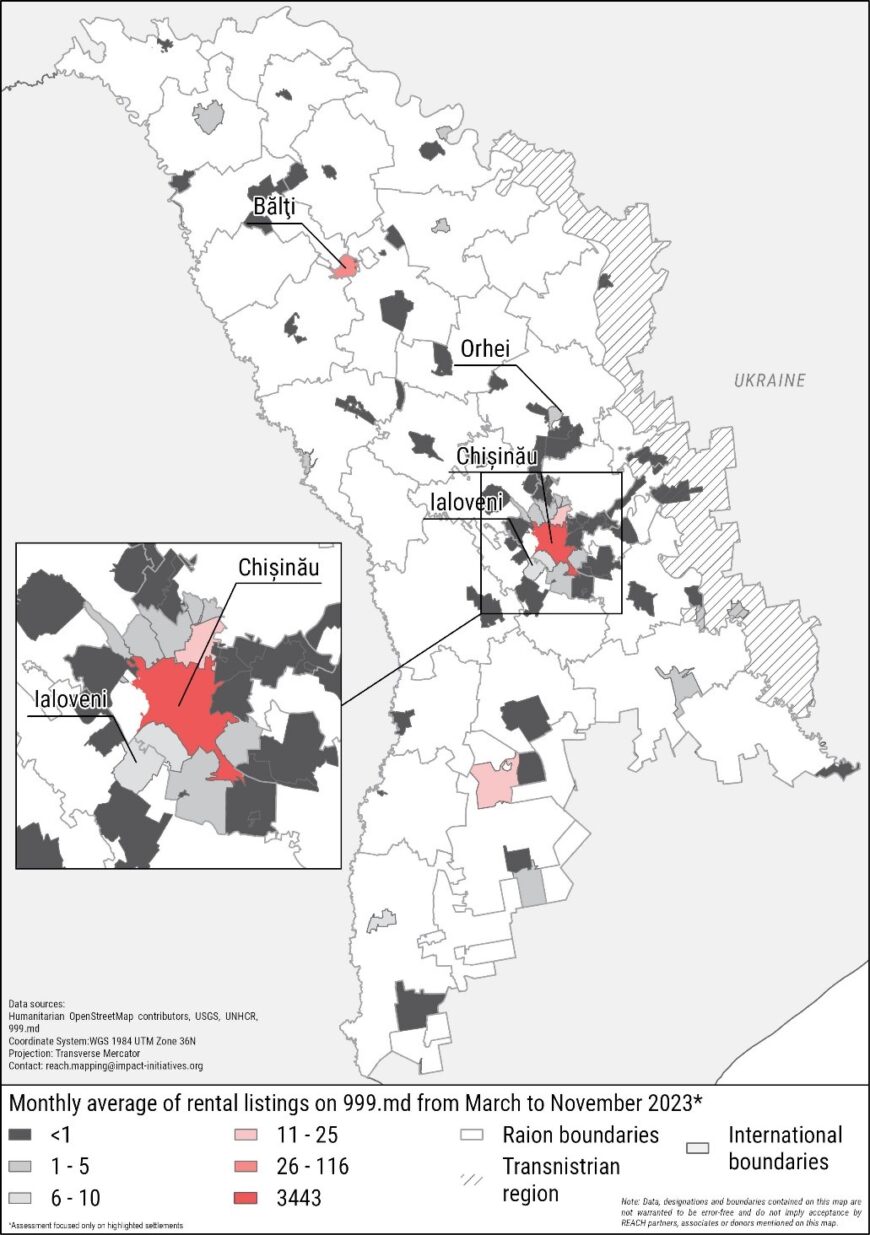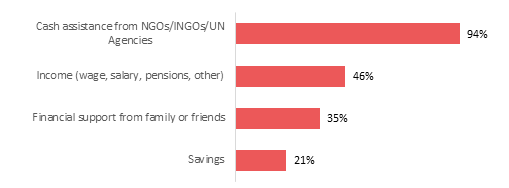Over a million Ukrainian refugees have sought refuge in Moldova since the escalation of the conflict in Ukraine in February 2022 and of these, 120,000 continue to remain in Moldova*. To inform the effective design of rental assistance programmes aimed at meeting the acute needs of refugees for adequate accommodation, REACH – a joint initiative of IMPACT Initiatives, Acted and the United Nations Operational Satellite Applications Programme (UNOSAT) – conducted two rounds of an assessment on the rental market dynamics in Moldova and the experience of refugees from Ukraine searching for rental accommodation. Round 1** of the Rental Market Assessment was conducted from March to September 2023 and Round 2 was conducted from October 2023 to January 2024.
Though Refugee Accommodation Centres (RACs) – which offer the most vulnerable refugees temporary housing and basic assistance – continue to be operated and are housing 2,308 refugees as of the end of December 2023, most refugees are living within Moldova’s host communities. As such, several rental assistance programmes, including Acted’s EU-funded Cash for Rent programme, have been implemented to support refugees in finding and securing rental accommodation in the medium term. The Rental Market Assessment conducted by REACH together with its PLACE consortium partners – Acted, IMPACT, the Norwegian Refugee Council and People in Need – sought to address the limited information available on the costs, availability, and access of Ukrainian refugees to rental accommodation in Moldova.
Round 2: Observing changes in the rental market over time
Round 1 of the assessment found that rental accommodation was unaffordable for many refugees, that many refugees had informal rental agreements to maintain flexibility and reduce the cost of renting, and that some refugees had faced discrimination when looking for rental accommodation, among other findings. Round 2 of the assessment sought to observe changes in rental market dynamics over time and fill the remaining gaps identified in Round 1, including the specific difficulties faced by refugees with mobility disabilities in the rental market and the impact of the recently implemented Temporary Protection status on refugees’ access to rental housing. This assessment was made possible thanks to the partnership with the European Union.
As was conducted in Round 1, REACH interviewed refugee tenant households, rental service providers including landlords and real estate agents, and other key informants with specialist knowledge of the rental market and the experience of refugees. Focus group discussions with refugees and the host community were also conducted, along with the monitoring of rental advertisements on a major rental advertisement website known as 999.md, in order to assess the availability and affordability of rental accommodation in Moldova. Additionally, refugees with mobility disabilities were interviewed in Round 2 to better understand their experiences in the rental market. The assessment focused on four localities: the urban centres of Chișinău and Bălți, and the semi-urban localities of Ialoveni and Orhei.

More refugees are relying on cash assistance to afford rent
94% of surveyed refugee households in Round 2 relied on cash assistance as one of their financial resources to afford their latest rent payment compared to only 67% of the households in Round 1. Only 46% relied on income. Additionally, over half of the households considered an end to cash assistance as the most likely reason that could lead to an eviction. This suggests that strategies to decrease refugees’ reliance on financial assistance are needed to support their ability to afford rental accommodation in the long term.

This reliance on cash assistance could also be due to the steady increase in rental prices in Moldova, as the average price of rental accommodation advertised on 999.md from March to November 2023 increased by €132. Though the average advertised rental price during this period was €432, surveyed refugee households during Round 2 paid an average monthly rent of €234, suggesting a continued preference for affordable housing possibly due to an inability to afford accommodation at the average market rates.
Among the rental service providers typically requesting a deposit from tenants in Round 2, most were requesting a deposit of two months’ rent, while several in Bălți were requesting six months’ rent. 40% of surveyed households in Round 2 had paid a deposit for their rental accommodation, of which the average paid was €490. The average paid in semi-urban locations was higher than that paid in urban locations.
The average cost of utilities declined by more than half in most locations between Round 1 and Round 2. This could be reflecting a more stable country programme for energy consumption compared to the beginning of 2023. However, the cost of heating in the winter months that followed the period of data collection likely led to an increase in the average cost of utilities.
Discrimination continues to impede refugees’ access to rental accommodation
Discrimination against refugees by landlords was the greatest difficulty faced by surveyed households searching for rental accommodation in Round 2 of the assessment. This was connected to landlords’ concerns that refugee tenants would damage their property, particularly if the household includes pets, children, or people with disabilities. The perception that aid has been given exclusively to refugees instead of also to members of the host community is said to have also created a more negative perception of refugees in Moldova, leading to discrimination.
While searching for housing, 60-70% of landlords, upon hearing that we are Ukrainians, immediately refused.
We even know two or three cases that when the landlord found out that the refugee is receiving help for rent, they increased the prices.
Relationships between refugees and host communities were described as mostly positive in Round 2, but with reports of discrimination and stigmatisation. 56% of surveyed households consider their accommodation to be in a neighbourhood or community that welcomes their presence, while 11% did not feel welcome in their community and 33% were unsure. Households in the semi-urban settlements of Ialoveni and Orhei reported feeling the most welcome in their communities.
In Bălți, we encountered local discontent with the fact that we were paying financial aid to Ukrainians. Housing was scarce, the demand increased and so did the prices. There was tension between the locals and Ukrainians.
Although most households surveyed in Round 2 had at least one member with Temporary Protection (TP) status, very few reported it having an impact on their access to rental housing. A few key informants explained that TP benefited refugees through enabling them to stay longer in the country, and thereby allowing them to sign longer-term rental agreements.
A lack of rental housing suitable for refugees with mobility disabilities
Finding accessible housing is the main difficulty faced by refugees with mobility disabilities. Greater focus needs to be put on the adaptation of rental housing to their needs, including the installation of accessibility infrastructure for people with disabilities. Few legal protections exist to ensure the accessibility of rental housing to people with disabilities in Moldova.
Many refugees with mobility disabilities are struggling to afford rent and any additional expenses related to their disability. Most are reportedly unemployed and relying solely on their pensions or assistance from NGOs.
This month we have no money to pay the rent because we bought pills and injections for me. I am constantly faced with the choice of either getting treatment and eating or paying the rent.
The assessment findings highlight the need for continued support to refugees in securing adequate mid-term accommodation through the Moldovan rental market. This need is even higher for vulnerable groups, particularly people with mobility disabilities who face a greater financial burden and scarcity of accommodation adapted to their needs. Therefore, more targeted interventions for this vulnerable group may be appropriate. Additionally, greater consideration is needed on how to address continued discrimination against Ukrainian refugees in the rental market.
Read the full report of Round 2 of the Rental Market Assessment here.
**Round 1
First round assessment report : https://www.acted.org/en/moldova-insights-into-the-rental-landscape-for-ukrainian-refugees/
The report Rental Market Assessment Round 2: https://repository.impact-initiatives.org/document/reach/60b0a14f/REACH_MDA2301_Rental-Market-Assessment_Round-2-Report_2024-01_Final.pdf
UNHCR data : https://data.unhcr.org/en/country/mda